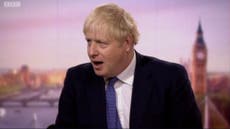Coronavirus: Government accused of sparing wealthy, Tory voting areas from local lockdowns
Labour raises prospect of ‘political interference’ in decisions over which locations face restrictions
Your support helps us to tell the story
From reproductive rights to climate change to Big Tech, The Independent is on the ground when the story is developing. Whether it's investigating the financials of Elon Musk's pro-Trump PAC or producing our latest documentary, 'The A Word', which shines a light on the American women fighting for reproductive rights, we know how important it is to parse out the facts from the messaging.
At such a critical moment in US history, we need reporters on the ground. Your donation allows us to keep sending journalists to speak to both sides of the story.
The Independent is trusted by Americans across the entire political spectrum. And unlike many other quality news outlets, we choose not to lock Americans out of our reporting and analysis with paywalls. We believe quality journalism should be available to everyone, paid for by those who can afford it.
Your support makes all the difference.The government has been accused of sparing wealthy and Tory voting areas from local coronavirus lockdowns, while poorer areas of the country with comparatively lower infection rates face tougher restrictions.
Some constituencies in the so-called red wall that switched from Labour to the Tories at the last election have not faced curbs on movement despite recording an increase in cases sufficient to trigger restrictions in Labour-voting areas in the region.
The red-to-blue swing seats of Wakefield in West Yorkshire, with 73 cases of coronavirus per 100,000 population, and Barrow-in-Furness in Cumbria, with a rate of 112, are both free of additional measures, for example.
But Greater Manchester, home to a swathe of Labour seats, had an average rate of almost 24 per 100,000 when lockdown was introduced earlier in the summer.
According to an email published by The Sunday Times, Professor Dominic Harrison, director of public health for Blackburn with Darwen, wrote to ministers last week warning that “more economically challenged boroughs [were] being placed into more restrictive control measures at an earlier point in their ... case rate trajectory.”
He said that had the effect of “exacerbating the economic inequality impacts of the virus...giving an economic ‘double whammy’ to more challenged areas.”
Professor Harrison was responding to figures that showed the government first imposed restrictions on Blackburn with Darwen - one of the poorest areas in the country - when their weekly Covid-19 rate passed 60 cases per 100,000.
Seats represented by the chancellor, Rishi Sunak, and the housing secretary, Robert Jenrick, have rates of infection of 73 and 84 respectively but have avoided lockdowns. Those figures compare with a national rate across England of 28.
“Are you more likely to have social lockdowns earlier and for longer and at a lower confirmed case rate if you are a northern, less wealthy, non conservative voting #localgov area?” Professor Harrison tweeted. “Check the data...”
Jim Shorrock, a former Labour mayor of Blackburn with Darwen, said the figures were “confirmation of what some of us have thought for some time”.
Labour said the data raised questions as to why those living in parts of the Midlands and the north were “having to face restrictions when other parts of the country that have seen infections rise are not”.
Shadow health secretary Jonathan Ashworth told BBC One's Andrew Marr Show: "Because there is no clear guidelines as to why an area goes into restrictions and how an area comes out of restrictions then there is a suspicion that there is political interference - I hope there isn't.
"But until the government publish clear guidelines, that suspicion will always linger."
A Department of Health and Social Care spokesperson told The Independent the Covid-19 incidence rate was “only one of a set of considerations regarding when it is appropriate to impose and release restrictions”.
The spokesperson said: “Decisions are made in close consultation with local leaders and public health experts, informed by the latest evidence from the JBC (Joint Biosecurity Centre) and NHS Test and Trace, PHE and the Chief Medical Officer for England.
“While we recognise how much of an imposition these measures are, they are based on the latest scientific evidence in order to suppress the virus and protect us all while doing everything possible to support the economy.
“We continue to work closely with local authorities and health protection teams and announced £7m funding to support them during this period of further restrictions.”



Join our commenting forum
Join thought-provoking conversations, follow other Independent readers and see their replies
Comments